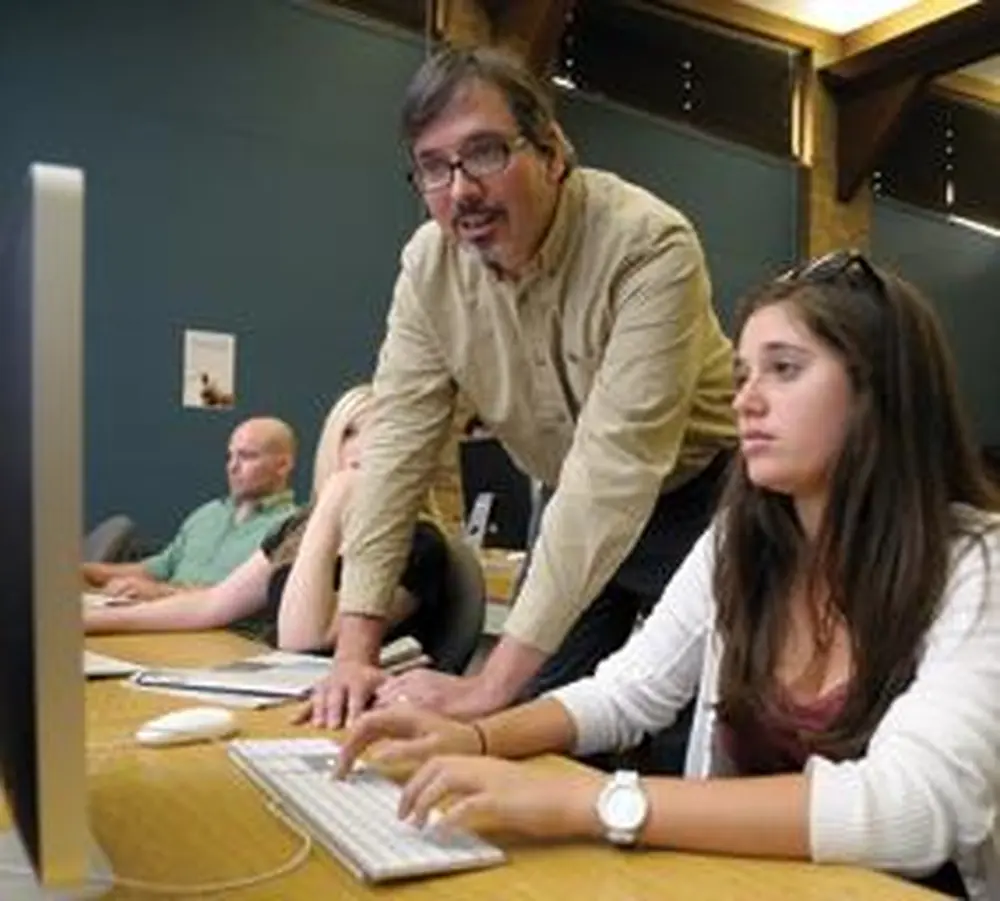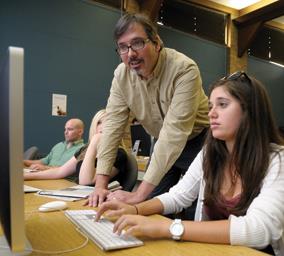

Every generation, it seems that someone in the older population looks around at the new crop of students and announces that we are in the midst of a writing crisis. But Gail Hawisher, director of the University of Illinois Center for Writing Studies, takes issue with this common notion.
“More people in the world are writing today than at any other time,” Hawisher says. “To represent it as a crisis when you see the remarkable work that students are doing in multimedia venues, which is at the heart of being literate today, is to sell this generation short.”
According to Hawisher, there has been a move to broaden the definition of literacy to include composing for multimedia. And in multimedia work, ironically, it’s the younger generation shaking their heads at their less tech-savvy elders, such as a professor who picked up a mouse and tried to use it like a TV remote.
“Writing has always been shaped by technology,” adds Patrick Berry, a graduate student in the Center for Writing Studies. “Early on, if you were not able to type on a typewriter, you would have had a hard time functioning. I think you see this continuing as people find new methods of expression, like blogging or putting together sophisticated multimedia presentations.”
David Stone, a science teacher at University Laboratory High School in Urbana for 27 years, has not seen a writing crisis either. With all of the forms of communication today, from Twitter and texting to Facebook and online videos, he too believes students are writing and reading more than ever. Despite the occasional horror story of “textspeak” seeping into traditional papers (U C it on occsn), he says his students move easily from one writing form to the next.
“Students today are more versatile and flexible in their writing, hopping from style to style, from texting to blogging to formal papers,” Stone points out. He sees this flexibility firsthand through the ExploraVision Awards, the largest international science and technology competition in the world, attracting 20,000 students every year.
Stone’s teams have won the high school category two straight years and four times out of the past 15 years. ExploraVision may be a science contest, but it incorporates a heavy dose of writing—a traditional, 11-page paper, as well as writing and producing for a website and video.
Stone’s work in ExploraVision was what first inspired him to check out the U of I Writing Project, which reaches teachers of all grade levels. After seeing what teachers in the program were doing in writing for new technology, he became the first of two science teachers to ever take the workshop in Urbana.
As a funded site of the National Writing Project, the U of I Writing Project is an intensive, four-week program during the summer, and it exploded Stone’s preconceived notions. He went into the project thinking of poetry as dull and blogging as excessively self-focused. But today he writes his own blog, with a national readership, and he finds himself wandering into the poetry section of the bookstore to check what is on the shelves.
Stone even dabbled with writing poetry for the first time and has become a self-described “zealot” for the National Writing Project, which taught him that writing is much more than just putting words on paper. He says it’s about thinking, organizing, producing, and presenting, and it’s about using all kinds of new media and technology.
However, the Writing Project is only one of many initiatives of the U of I Center for Writing Studies, which was established in 1990 to work with both students and faculty.
“We also show faculty how they can use writing to increase the learning of their students,” says Hawisher. “Research has shown that active writing encourages you to think differently, and you begin to remember things you’ve read that you wouldn’t otherwise.”
Berry cites the case of a horticulture professor whose students began each class by writing about what they learned during the previous class. When a different professor later dropped the class’s writing exercise, comprehension and grades plunged dramatically.
“Translating ideas into your own words contributes so much to your learning,” Berry says.
Stone concedes that reading in a focused way may be more of a challenge for today’s students in part because of the sheer quantity of information in the new media. But he says students have become adept at skimming and “assessing credibility on the fly.” When he was growing up, he says students were more apt to consider anything they read as being credible because sources of information were so limited.
“Today, kids read and critique at the same time, and they don’t accept everything they read,” he says. “There are so many strengths that come out of the new media.”
For instance, Stone sees the strength of community that can come from blogs about a shared interest. His blog, which features his passion for photographing arthropods, now has loyal readers from across the country.
“If you would have said to me that I would have been doing all this stuff a year ago, I never would have believed it,” he says. “The Writing Project has really expanded my use of different technologies. I’m surprised at where it’s taken me.”
- The University of Illinois Writing Project Summer Institute for teachers will be held on campus June 13-July 8, 2011. Applications are due by midnight on Friday, February 18.